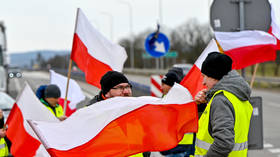Poachers face crackdown
The Russian President has personally taken the lead in tackling the crisis facing Russia's fishing industry. On Friday he met officials in the port of Astrakhan. An estimated 90% of the market is supplied by poachers.
The President says that illegal fishing in Russia's waters is one of the most serious problems facing the industry .
“Why do we need this economic zone then? We've announced that these waters are our economic zone – is it ours? whose is it? We don't have any systems of accountability and control over the volume of fishing there or the export of our fish. This export doesn't go through any customs procedures. We do not even have international agreements with the majority of countries who are consumers of our fish. There are no legal mechanisms of monitoring the fishing vessels in this zone. The fishing business in our economic zone is a source of a great number of illegal financial operations and the government willl do its best to impose order in this zone,” Vladimir Putin said.
The President visited Russia's sturgeon breeding fishery to inspect new technology. The centre, which was opened in 1994, plays a major role in the fight against the shrinking sturgeon population in the Caspian Sea. Over the last 13 years it has bred over 120 tonnes of fish, which were released into the sea. However, the number of industrially reared fish has not been enough to repair the damage caused by poaching, and specialists are cautious about whether the new regulations will be effective.
Illegal caviar farming is blamed for the decreasing fish stock. Russia's Interior Ministry says a recent crackdown saw 100 kilos of poached caviar seized in Moscow alone.
Black caviar is often called 'black gold'. To buy just a hundred grams on the international market you'll have to pay $US 800. Despite being the source of much of the world's caviar, it costs around $US 200 in Russia. Further price increases are expected as sturgeon products are becoming increasingly limited on the domestic market.
In the last four years, the Russian authorities have not allowed any industrial sturgeon fishing. Therefore, the only caviar allowed for sale must have come from confiscated stock.
Nevertheless, the Agriculture Ministry believes that as much as 90% of the available caviar is from poachers with false documents. In an attempt to eliminate this illegal trade, new regulations introduced in August mean that all confiscated sturgeon products should be destroyed and not sold on. The intent of the legislation is to remove the major economic incentives for poaching in the Caspian and Azov seas, where most of world's caviar originates.











